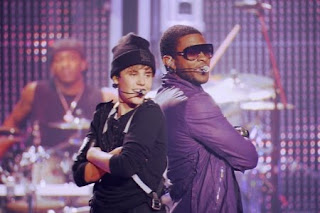 On the set of Lethal Weapon 5: The New Batch
On the set of Lethal Weapon 5: The New BatchJustin Bieber has become such a common, easy target for ridicule that I don't really have any desire to attack him. He's constantly the butt of jokes of varying degrees of mean-spiritedness about his age (he's an infant), voice (he had a sex change), his rabid fans (they're... well, rabid fans), and so on. It's not that they can't be funny, it's just that it's something that doesn't take a lot of effort or originality. For my part, I'll say that he seems benign enough and that he's put out a few very solid, enjoyable pop songs.
So it's with a little snark- though, and this is important, not merely snark- that I say that the first analogue to Bieber documentary Never Say Never that came to mind was, yes, Triumph of the Will. To be clear, Bieber is no Hitler, and director Jon Chu is no Leni Riefenstahl (for one, Riefenstahl didn't make Step Up 2 The Streets), but damn me if the feeling isn't the same. This is not simply a nearly two hour commercial for Bieber and his brand- this is exuberant spectacle in the service of out and out propaganda. It's fun (and easy) enough to compare the legions at Nuremberg heiling their Führer with crane shots of a sold out Madison Square Garden flying over thousands of pairs of hands making the same heart gesture that's one of Bieber's trademarks. Less obvious- and more troubling- is to realize how alike are shots of Hitler greeting admirers and kissing babies to the similarly well edited, obviously staged shots of Bieber as "just an ordinary kid," walking the streets of his hometown Stratford, Ontario eating pizza and offering banal platitudes like "Don't give up on your dreams" to the shell shocked fans he comes across (and, in one of the queasiest moments in a film full of queasy moments, dropping some pocket change into the violin case of a girl playing on the same street corner where he once performed). Both films, essentially, are well-staged, well executed documents of rallies, and both camouflage an insidious agenda with layers upon layers of feel-good spectacle.
Bieber Fever doesn't seem that harmful or different from any other pop cultural Fevers and -Manias; the film, though, feels awfully vile. Scenes of Bieber's crew and managers hand delivering free tickets to surprised, delirious fans, for instance, reeks of the basest sort of calculated PR grab. Elsewhere, an extended narrative following Bieber's struggle with swollen vocal cords midway through a tour is less a "day in the life" peek than it is an attempt to preempt any accusations of exploitation- again and again we're told in no uncertain terms that, despite the pain, this is the life Justin has chosen. What choice a 16 year old has when faced with this sort of immediate fame is a question avoided for good reason. Never Say Never insists that everyone around Bieber has his best interests at heart; that includes, of course, Justin's dad, a 30-something who left Bieber's mother when Justin was 10 months old but who now miraculously finds the time to sit backstage and play best buddy to his cash cow of a son, as well as legions of producers and records execs who, trust us, have no vested interest in Bieber taking on a 70+ stop tour.
This hype machine, though, can do nothing to prop up the star himself- as a documentary subject, Bieber is a void. Backstage footage and biographical segments are so dull precisely because Bieber is so dull- he comes off as a nice enough kid with quite a bit of talent, but without anything that interesting to say about anything (to be fair, who does when they're 16?). Likewise, the voice that we're supposed to be stunned by never really seems that spectacular. Youtube clips shown of a younger Justin reveal a warts-free but unmemorable voice, and the concert footage is so processed and over-produced as to make it sound exactly like an album recording, complete with conspicuous overdubbing. Admittedly, some of the concert footage shows that Bieber has great energy and showmanship; as a personality, though, he's simply not interesting enough to fill up this kind of space, and so the Bieber Marketing Machine steps in almost entirely.
For the preteen girls in the theater for a birthday party waving their hands along with the music (and, much to my glee, offering plenty of disgusted "eww!"s whenever Bieber was on screen shirtless), I truly believe Never Say Never is innocent enough fun- this isn't the end of Western Civilization. For my part, though, I couldn't help thinking how the film was little more than a tool to turn this one teenager into pure commodity while pacifying the concerns of any wayward, gullible parents. All of this, incidentally, married to the 3D format which is quickly becoming our preeminent force of cinematic artifice. The best 3D movies have accepted this (including Chu's own Step Up 3D, which used the medium to create a freebased kinetic frenzy of filmed dancing and CGI effects) or subverted it (as in Jackass 3D, where the medium's inherent artificiality made it even harder to comprehend the stunts as anything but terrific, surreal cartoons); Never Say Never, not surprisingly, does neither. The 3D is simply used to try and heighten the "I'm really there!" feel of the concert footage, though it accidentally causes Bieber and his movements to look even more robotic and fake. It's a handy metaphor for the whole film- Bieber himself made into a pristine, digital spectacle bereft of depth or reality.
A cinematic translation of preteen frenzy turned cynical propaganda? Never say never.
Justin Bieber: Never Say Never 3D (2011, d. Jon Chu): 1/4

No comments:
Post a Comment